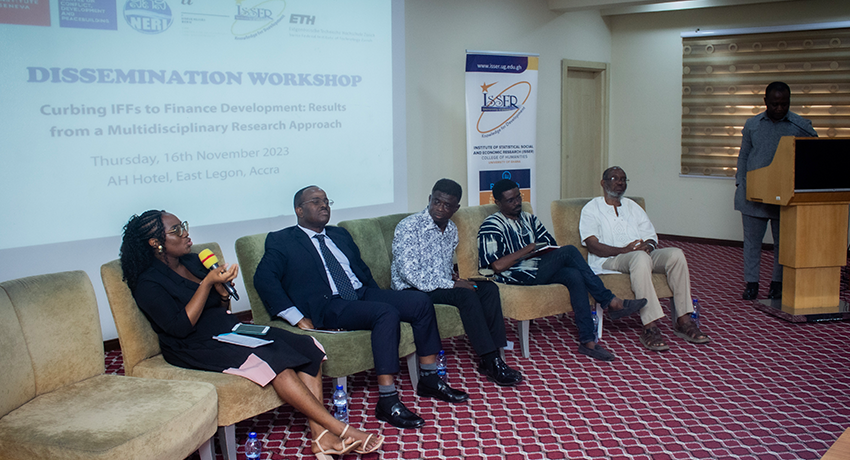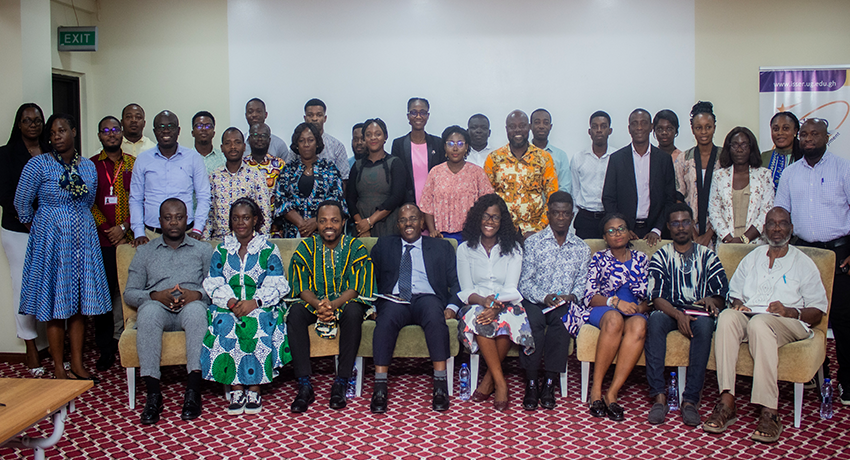Participants included academics, the media, and an array of representatives from the commodity trade value chain, making for informed discussions and productive outcomes.
Ghana’s ability to minimize commodity-trade-related Illicit Financial Flows (IFFs) and raise revenue for development requires a multi-pronged approach which in turn hinges on accurate data, effective enforcement mechanisms, citizen engagement, and increased local investment in natural resource extraction. These are the key messages that emerged from a dissemination workshop organized to reflect on the outcomes of the ISSER-based project, "Curbing Illicit Financial Flows to Finance Development”.
“Our objective for organizing this workshop is to present the highlights of the rigorous research that has been ongoing for the last six and half years. This forum also offers the opportunity to engage key stakeholders, particularly those with whom we have been collaborating for more than half a decade, to ensure that their valued perspectives are heard, and to sustain the conversation beyond the life of the project," Dr. Fred Dzanku, Principal Investigator, said.
"Perhaps most importantly, we aim to mobilize stakeholder support to raise the uptake of key research recommendations,” he added.
Under the theme “Curbing IFFs to Finance Development: Results from a Multidisciplinary Research Approach," the workshop formed part of activities marking the conclusion of the six-year project. It drew representatives from various spheres of society, including actors in the commodity trade value chain and media representatives, and provided a significant platform not only to discuss and proffer solutions for tackling the IFFs but also to disseminate the key findings to policymakers and the public.
The Workshop

A special report on Ghana’s Gold for Oil Initiative by Dr. Dzanku, one of the event’s main highlights, provided the basis for exchanges that went beyond the study to address pertinent issues in Ghana’s extractive industry. Participants also took in insights from a video documentary on IFF, developed as part of the project, and three presentations representing the various work streams of the project.

A six-member panel discussion involving an IFF measurement expert, key players from the field of commodity-related trade and moderated by an experienced journalist provided an opportunity for candid exchanges. This further enriched the discussions, leading to an engaging interaction session involving all participants.
Panellists (left–right): Jennifer Hall, University of Ghana School of Law; Sulemana Koney, CEO, Chamber of Mines; Asuo Afram, Director for Economic Statistics, Ghana Statistical Service; Nii Benaiah Nii Addo, Co-Ordinator, Tax Justice Coalition; and Bishop Akolgo, ISODEC/UN Expert for IFF Statistical Measurement in Ghana. Raymond Acquah, Head of Research, Joy News (standing) moderated the discussions.

The informed interventions of participants were valuable in achieving an engaging and productive event.

Media representatives had the opportunity to engage with project team members and panellists, facilitating the dissemination of findings to policymakers and the wider public. Principal Investigator, Fred Dzanku is pictured during post-event media interviews.
The workshop was held on 16 November 2023 at the AH Hotel in Accra, with participants including representatives from the extractive industry, natural resources governance, and financial regulatory bodies, NGOs, among others. Media coverage of the event highlighted the key takeaways and discussions, further amplifying the impact of the workshop. Below are selected online reports based on the discussions.
About the project
The "Curbing Illicit Financial Flows” project is a six-year (2017 – 2021) interdisciplinary research that explored how commodity-trade-related Illicit Financial Flows (IFFs) from Ghana can be significantly reduced to finance the Sustainable Development Goals (SDGs). It was implemented by a team of researchers at the University of Ghana in collaboration with the Centre on Conflict, Development, and Peacebuilding (CCDP) of the Graduate Institute of International and Development Studies with project sites being Ghana, Laos, and Switzerland.
The members of the Ghana research team are Fred Dzanku, ISSER; Angela Alu, Post-Doctoral Researcher; Ama Asantewah Ahene-Codjoe, Department of Agricultural Economics and Agribusiness; Jennifer Hall, University of Ghana Law School and Abigail Tetteh Yankey, Department of Political Science.
- Log in to post comments

